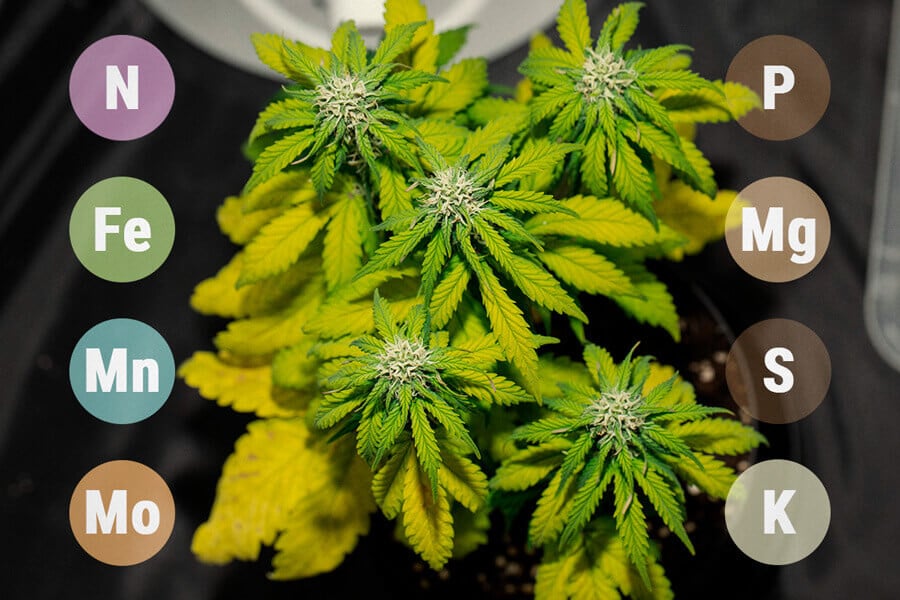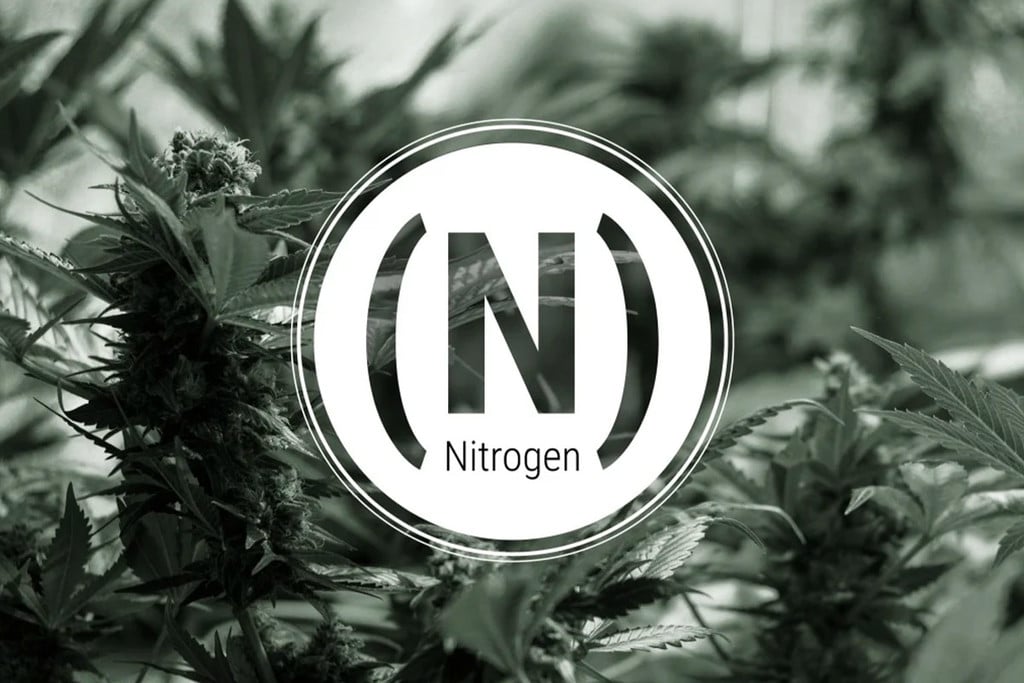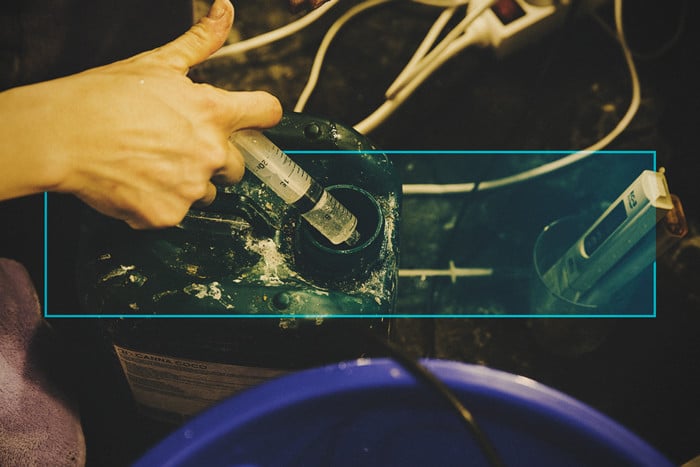.

Zinc Deficiency in Cannabis: Signs and Solutions
Zinc deficiency is uncommon in cannabis, but as this micronutrient is key to so many essential functions, it pays to know how to spot and treat the issue if it does occur. Follow along to learn all you need to know to prevent a zinc deficiency from thwarting your grow-op.
Contents:
Zinc is crucial for plant health. Though a micronutrient, you should still know the role this nutrient plays, and understand how to spot, treat, and prevent a deficiency. Doing so will help to ensure you achieve healthy, abundant cannabis plants.
In this article, we’ll explain how to do just that.
Understanding the Role of Zinc in Cannabis Growth
Zinc is an essential micronutrient for cannabis—and most other plants. In weed plants, zinc is used to produce enzymes that are necessary for growth and development. In particular, this micronutrient is used for the production of enzymes necessary for carbohydrate, protein, and chlorophyll production. Without any of these, a cannabis plant will not grow. Therefore, when faced with a lack of zinc, a plant’s growth will begin to slow and then stall entirely.
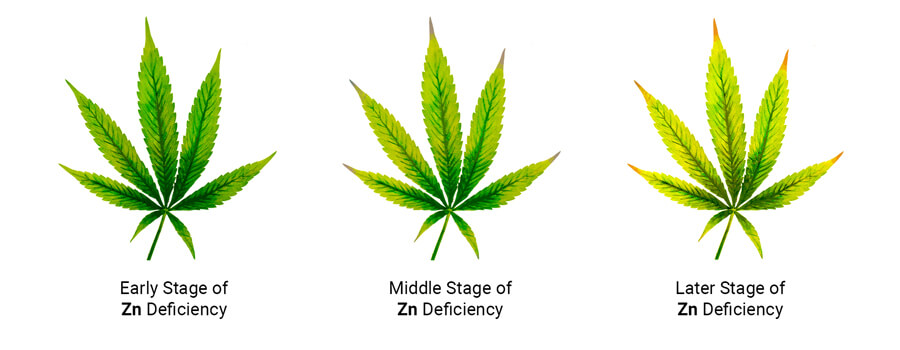
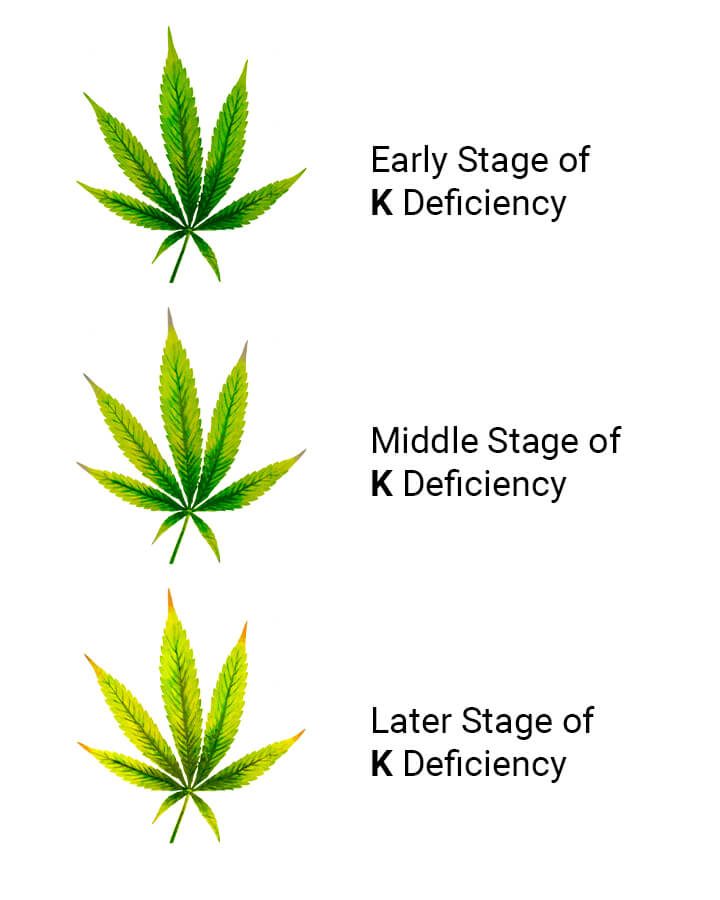
Zinc: A Key Micronutrient for Cannabis
The nutrients that plants need are categorised broadly as macronutrients and micronutrients.
The three macronutrients are nitrogen (N), phosphorus (P), and potassium (K). Cannabis plants require these in very large quantities or they won’t grow at all. Micronutrients, on the other hand, are required in much smaller quantities.
However, despite what some think, micronutrients are no less important, they just needn’t be as abundant. A plant that only receives macronutrients will be unable to survive.
Good-quality cannabis feeds will contain the correct ratios of macro and micronutrients, and you can easily find recipes for homemade feeds that also contain everything necessary for healthy, sustained growth.
The Function of Zinc in Cannabis Plants
Here, we’ll go into more depth about the roles zinc plays in the cannabis plant. As you’ll see, it’s necessary for the very core functions of the plant’s growth.
- Enzyme activation
- As mentioned, zinc is necessary for the creation of enzymes that are responsible for a whole range of essential functions within cannabis plants.
- DNA and RNA synthesis
- Zinc plays an important role in assisting with the synthesis of DNA and RNA in plant cells and nuclei. Without zinc, plant cells are not able to replicate properly, leading to developmental problems.
- Pest and disease resistance
- Zinc, among other nutrients, plays a key role in helping to defend plants from pests and disease. For one, a generally healthy plant will have a better immune system. More specifically, zinc can help to promote the production of metabolites such as callose, glucosinolates, lignin, phenols, and phytoalexins.
- Flower and seed development
- In order for plants to produce healthy and bountiful flowers and seeds, zinc is necessary. Not only is it important for the specific development of these parts of the plant, but a plant that has developed healthily throughout its life cycle will produce better flowers and seeds.
- Protein synthesis
- Almost 10% of plant proteins belong to the zinc proteome. This means that they require zinc for either catalysis or as a structural element. As such, zinc is highly important if plants are to properly produce proteins—which are necessary for almost all functions.
- Photosynthesis
- Zinc is known as a transition metal, and these are in high demand when it comes to photosynthesis. Plant chloroplasts (where chlorophyll for photosynthesis is produced) are organelles with high transition metal ion requirements. Without zinc, plants would be unable to carry out one of their most essential functions.
Cannabis and Zinc Deficiency: Signs and Symptoms
Now that you know a little more about the role zinc plays in cannabis growth, we’ll explain how to spot a zinc deficiency in cannabis plants. As with many deficiencies, the signs look somewhat similar, so you’ll need to observe your plants carefully to discern what’s going on.
Chlorosis
When weed plants experience a zinc deficiency, signs of chlorosis will appear early on. Chlorosis occurs when chloroplasts begin to die off and plants can no longer produce chlorophyll. As such, they will begin to lose their green colouration, first turning yellow and then brown.
Chlorosis will first show in younger leaves at the top of the plant, as zinc is an immobile nutrient. If older growth discolours first, zinc is probably not what’s lacking.
Interveinal Chlorosis
More specifically, the earliest stages of chlorosis will be interveinal, meaning that the edges of leaves and the spaces between the veins will yellow the soonest.
Stunted Growth
Without enough zinc, plants cannot form new cells properly, and growth will slow and stall. You’re more likely to notice discolouration of the leaves before you notice that your plant has stopped growing, but this is also a sign to bear in mind.
Stalled growth without other signs can signal almost any problem, and thus is not a particularly enlightening sign by itself.
Poor Flower Development
If plants are struggling to get enough zinc, then flower and seed production might be underwhelming. If all else is well, but you notice that your flowers aren’t really filling out, then it may be that you have a zinc deficiency on your hands.
Delayed Flowering
What’s more, a lack of zinc can also delay the flowering period. But this is dependent on a range of other factors, and alone doesn’t tell you much.
But if you notice delayed flowering along with specific leaf discolouration, then it may well be that your plant doesn’t have enough zinc.
Abnormal Leaf Colouration
While leaves will pale and yellow at first, they will go on to brown and curl if a zinc deficiency is left untreated. So if you notice discolouration other than yellowing—including brown spots—don’t immediately discount the possibility of a zinc deficiency.


The Causes of Zinc Deficiency When Growing Weed
It’s worth noting that a lack of zinc in the feed or soil isn’t always the cause of a zinc deficiency in cannabis plants. Indeed, weed plants require very small amounts of zinc, and it tends to be present in soils, and will certainly be present in good-quality feeds and composts—even those made at home. So it’s very possible that a zinc deficiency is the result of another problem.
As such, you should investigate the other possibilities (to follow) before assuming your soil needs extra zinc.
-
Low zinc in the soil
Despite what we said above, a zinc deficiency may well be the result of too little zinc in the soil or growing medium. If you’re using good soil with a good feed, you can safely assume this isn’t the case.
But if you’re using poor soil, or even good soil that you’ve been adding poor feed to, it might be that the zinc has been used up. Low-quality feeds or composts made with little organic matter may be lacking in zinc.
The good news is that it’s easy to get your hands on good feed, and almost all plant fertilisers contain ample zinc. Likewise, soils made at home from a range of organic matter will also contain enough zinc.
-
High pH
A growing medium with a pH that’s too high (or alkaline) can bind zinc ions, inhibiting your plant’s ability to uptake this micronutrient. For soil grows, a pH above 7.0 is too high. For hydro and coco grows, a pH above 6.5 is too high.
-
Excessive phosphorus
If there’s too much phosphorus in the growing medium, this can cause nutrient lockout and stop your plants from being able to uptake adequate zinc.
-
Poor root health
Plants with sickly roots face all sorts of challenges—nutrient deficiencies chief among them. Poor root health can be the result of poor growing practice (overwatering or badly executed transplanting) or the unfortunate result of some pathogen in the soil.
How to Treat Zinc Deficiency in Cannabis Plants
Considering the above, it’s more likely that a zinc deficiency is due to the composition of the growing medium, rather than simply being the result of too little zinc. Below, we’ll explain various steps you can take to investigate and fix a suspected zinc deficiency.
Correct pH
Perhaps the most likely cause (and one of the easiest to fix) is that the pH is too high. For soil grows, you can measure the soil and the runoff with a pH meter to discover if this is the case. If the pH is too high, then you can use a pH down solution to adjust it, until the runoff measures in the correct range (6.0–7.0)
For coco and hydro, the correct range is 5.5–6.5.
Improve Soil Organic Matter Content
If a lack of zinc is the problem, adding organic matter to the soil will deliver more zinc to the root zone. To achieve this, you can add manure, compost, or mulch—to name but three options. All of these will deliver a healthy dose of organic nutrients to your soil. With methods such as these, you needn’t worry about overfeeding.
Flush Soil
If you think that there are too many nutrients in the soil, and this is causing lockout, then you’ll need to flush the soil.
Flush several litres of clean, nutrient-free water through the soil, washing out the nutrient content. You can then start from zero and begin feeding anew—not adding too much this time!
It’s worth noting that organic fertiliser can’t really cause nutrient lockout, so if you replenish with this, rather than synthetic fertiliser, you’ll avoid this problem entirely in the future.
How to Prevent Zinc Deficiency When Growing Weed
Whether you’ve just fixed a deficiency, or are looking to avoid one in the first place, knowing how to prevent a zinc deficiency will put you in good stead.
What’s more, most of the steps mentioned here will prevent all deficiencies, and help to keep your plants in good health overall.
Improve Your Soil Biology
Improving your soil biology prior to starting your crop will have manifold benefits throughout the entire grow. Introducing beneficial microbes such as mycorrhizal fungi, which form a synergistic relationship with plant roots, will help them uptake nutrients and defend them against soilborne pathogens—all in exchange for plant sugars. A win-win!
Frequently Measure Soil pH
Measuring the soil pH once every week or two will help you keep an eye on it, and prevent it from getting off target. Adjusting pH is really simple, and if you catch a high or low pH early and adjust it, you can avoid encountering all sorts of plant problems. This is a very easy way to prevent nutrient lockout in all its forms.
Make Your Own Compost
Making your own compost will give you a fertiliser that’s packed with nutrients and is very high in organic matter, helping with nutrient cycling. Plus, it will save you money!
If you can make compost at home, you should—the benefits are myriad.
Zinc: An Overlooked Cannabis Micronutrient
Zinc deficiencies are fairly uncommon, and as it’s not a macronutrient, it's often overlooked. However, if you want to be a skilled cannabis grower, it’s important to know the roles that all nutrients play, and how to prevent deficiencies—not to mention rectify them. It pays to be prepared!



























